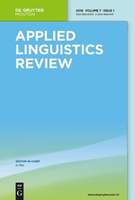
Applied Linguistics Review
Scope & Guideline
Elevating understanding of linguistic principles worldwide.
Introduction
Aims and Scopes
- Translanguaging and Multilingualism:
The journal emphasizes translanguaging as a pedagogical approach, exploring how multilingual individuals navigate and utilize their linguistic resources across contexts. It investigates the implications of these practices for language learning and teaching. - Intercultural Communication:
Research on intercultural communication is a core focus, examining how language shapes interactions across different cultural backgrounds. The journal seeks to understand the role of language in fostering intercultural understanding and navigating cultural differences. - Language Policy and Education:
The journal addresses issues related to language policy in educational settings, particularly concerning English as a medium of instruction (EMI) and the impact of language policies on learning outcomes and identity. - Ethnographic and Qualitative Research:
A significant portion of the journal's contributions employs ethnographic and qualitative methodologies to explore language practices in naturalistic settings, providing in-depth insights into the lived experiences of language users. - Social Justice and Linguistic Equity:
The journal is committed to social justice issues, examining how language intersects with identity, power, and inequality. It explores the role of language in promoting or hindering access to resources and opportunities. - Technological Integration in Language Learning:
The emergence of technology in language education is a growing area of interest, with studies focusing on the implications of digital tools and artificial intelligence for language teaching and learning.
Trending and Emerging
- Integration of AI in Language Learning:
There is a significant trend towards exploring the role of artificial intelligence in language education, including the use of AI tools for teaching, assessment, and enhancing intercultural communication. - Decolonial Perspectives in Language Education:
Emerging themes focus on decolonizing language education and considering Indigenous epistemologies and practices, reflecting a growing awareness of power dynamics in language teaching. - Critical Studies on Language and Identity:
Research examining the intersections of language, identity, and social justice is gaining traction, with an emphasis on how language practices shape and are shaped by social identities. - Multimodal Communication:
There is an increasing interest in multimodal communication, where researchers investigate how various modes (verbal, visual, gestural) interact in language use, particularly in digital contexts. - Impact of Globalization on Language Practices:
Recent studies are increasingly focused on how globalization affects language practices, including language commodification, hybrid identities, and the role of language in transnational contexts.
Declining or Waning
- Traditional Language Teaching Methods:
There has been a noticeable decline in research focused on traditional language teaching methodologies, such as grammar-translation methods and rote memorization techniques. The journal's current emphasis is more on innovative and interactive pedagogical approaches. - Purely Theoretical Linguistics:
Research that is purely theoretical and detached from practical applications in language education or sociolinguistic contexts seems to be less prevalent. The journal's focus is increasingly on applied research that addresses real-world language issues. - Static Language Policies:
Research centered on static or prescriptive language policies without consideration for dynamic and contextual factors is becoming less common. The journal now favors studies that highlight the fluidity and adaptability of language policies in practice. - Individual Language Skills without Contextualization:
There is a waning interest in studies that focus solely on individual language skills (e.g., grammar, vocabulary) without contextualizing these skills within broader social, cultural, or educational frameworks.
Similar Journals
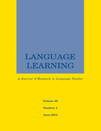
LANGUAGE LEARNING
Exploring the depths of language education.LANGUAGE LEARNING is a premier academic journal dedicated to advancing the field of language acquisition and education, published by Wiley. With a foundation dating back to 1948, the journal has carved an esteemed niche in the academic landscape, currently holding a prestigious Q1 rank in both the categories of Education and Linguistics and Language. It proudly occupies the 9th percentile rank in the Arts and Humanities domain and the 10th percentile in Social Sciences, illustrating its influence and reach. The journal publishes high-quality research that explores various dimensions of language learning, from cognitive processes to pedagogical approaches, making it an essential resource for researchers, educators, and students alike. Although Access options are non-open, the journal remains accessible to a wide audience, reinforcing its commitment to disseminating critical insights within the academic community.

Suvremena Lingvistika
Fostering Innovation in Linguistics and Language Studies.Suvremena Lingvistika is a distinguished open-access journal published by the Croatian Philological Society, dedicated to advancing research in the field of linguistics and language. Since its establishment, the journal has been pivotal in promoting scholarly dialogue within the linguistics community, especially among researchers and academics in Croatia and beyond. With an ISSN of 0586-0296 and an E-ISSN of 1847-117X, the journal has transitioned to an open-access model since 2007, ensuring that research is freely accessible to all. As of 2023, it holds a respectable Q3 ranking in the Linguistics and Language category, reflecting its potential contribution to the field. The journal's scope encompasses a wide array of linguistic disciplines, encouraging both theoretical and empirical studies. Supportive of new research, Suvremena Lingvistika aims to foster innovative approaches and methodologies in linguistics, making it an essential resource for students, researchers, and professionals eager to explore the complexities of language. With its ongoing publication until 2024, it continues to shape the linguistic landscape, providing valuable insights and fostering collaboration among scholars globally.
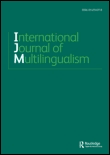
International Journal of Multilingualism
Fostering dialogue across diverse linguistic landscapes.Welcome to the International Journal of Multilingualism, a leading platform dedicated to advancing the field of linguistics and language studies. Established by ROUTLEDGE JOURNALS, TAYLOR & FRANCIS LTD and housed in the United Kingdom, this journal has rapidly ascended to a prestigious Q1 quartile status in both the Linguistics and Language categories as of 2023, ranking in the top 4% across related disciplines. With a remarkable Scopus ranking of #35 in Arts and Humanities and #38 in Social Sciences, it is recognized for publishing high-quality, impactful research that spans a diverse array of multilingual topics. The journal thrives on its commitment to examining the complexities and dynamics of multilingualism in contemporary society, making it an essential resource for researchers, professionals, and students alike. Although Open Access options are not currently available, the journal's rigorous peer-review process ensures that each publication contributes valuable insights into the field. Since its inception in 2004, the International Journal of Multilingualism continues to foster academic discourse and innovation, solidifying its role as a crucial outlet for scholarly work by 2024 and beyond.
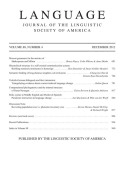
LANGUAGE
Illuminating the Complexities of Human CommunicationLANGUAGE, published by the Linguistic Society of America, is a premier academic journal dedicated to the rigorous study of linguistic theory and practice. With an ISSN of 0097-8507 and E-ISSN 1535-0665, this esteemed journal has established itself as a leading publication in the field of linguistics since its inception. The journal has consistently maintained a high impact factor, being ranked in the Q1 category in Linguistics and Language for 2023, placing it among the top tier of academic journals. Notably, it also holds impressive Scopus rankings, being positioned at #75 out of 1088 in Arts and Humanities, and #89 out of 1167 in Social Sciences, demonstrating a significant impact and reach in the discipline. While it is not an open-access journal, LANGUAGE provides crucial insights into linguistic research, fostering a vibrant academic community. Spanning years from 1996 to 2024, it continues to be an essential resource for researchers, professionals, and students alike, aiming to advance the understanding of language in its myriad forms and functions.

Revista Virtual de Estudos da Linguagem-ReVEL
Unveiling Innovative Perspectives on LinguisticsRevista Virtual de Estudos da Linguagem-ReVEL is a prominent academic journal dedicated to the field of linguistics, published by REVISTA VIRTUAL ESTUDOS LINGUAGEM in Brazil. With its ISSN 1678-8931, ReVEL aims to provide a platform for scholarly communication and dissemination of research across diverse areas of language studies, including sociolinguistics, language acquisition, and discourse analysis. As an open-access journal, it fosters accessibility to important linguistic research, allowing researchers, educators, and students alike to engage with the latest findings without subscription barriers. The journal’s focus on innovative methodologies and interdisciplinary approaches makes it a valuable resource for those seeking to deepen their understanding of language dynamics in various contexts. By contributing to the growing body of knowledge in this field, ReVEL plays a crucial role in promoting scholarly dialogue and enhancing the visibility of Brazilian linguistic research on a global scale.

Taiwan Journal of Linguistics
Pioneering Research for a Deeper Understanding of LinguisticsTaiwan Journal of Linguistics, published by CRANE PUBL CO, is a prominent Open Access journal dedicated to the field of linguistics since its inception in 2003. With its ISSN 1729-4649 and E-ISSN 1994-2559, this journal serves as a vital platform for the dissemination of significant research and scholarly discussions from Taiwan and beyond. The journal particularly focuses on advancing knowledge in linguistic theory, language acquisition, phonetics, and sociolinguistics, catering to a diverse academic audience including researchers, professionals, and students. Although it currently holds a Q4 ranking in the Linguistics and Language category, the journal's commitment to quality and accessibility positions it as an emerging resource for those engaged in language studies. Currently ranked #584 in Arts and Humanities and #668 in Social Sciences, it provides critical insights and fosters scholarly exchanges that enhance understanding within the field. The journal's open access model ensures the broadest reach for its published articles, facilitating the global sharing of linguistic research. For more information, visit the journal’s website to explore its latest publications and submission guidelines.
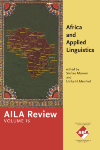
AILA Review
Championing quality research in linguistics and applied studies.AILA Review, published by John Benjamins Publishing Co, stands as a pivotal resource within the field of linguistics and language studies. With an ISSN of 1461-0213 and an E-ISSN of 1570-5595, this journal is dedicated to fostering innovative research and scholarship that advances the understanding of language in its diverse forms and applications. Spanning significant years from 2003 to 2016 and 2018 to 2024, AILA Review has established itself with a commendable reputation, reflected by its Q2 ranking in Linguistics and Language and notable Scopus rankings, positioning it in the 73rd percentile among Arts and Humanities. As an essential forum for researchers, professionals, and students alike, the journal invites high-quality contributions that engage with theoretical and practical aspects of language acquisition, multilingualism, and applied linguistics, enhancing discourse in these vital areas of study. Although not an open-access journal, its commitment to quality ensures that publications are widely recognized and cited, fostering impactful scholarly exchanges.
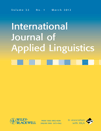
International Journal of Applied Linguistics
Pioneering Research for Language Educators and PractitionersInternational Journal of Applied Linguistics, published by WILEY, is a premier platform for cutting-edge research in the field of applied linguistics. With a notable Impact Factor and ranked in the top Q1 quartile of linguistics and language, this journal serves as an essential resource for scholars, practitioners, and students. The journal’s wide-ranging scope includes various subfields such as language acquisition, language education, sociolinguistics, and discourse analysis, fostering multidisciplinary approaches to language studies. It has achieved a significant Scopus Rank, placing it in the 90th percentile for both Arts and Humanities as well as Social Sciences categories, reflecting its high visibility and influence in the academic community. The International Journal of Applied Linguistics is committed to advancing the understanding of language use in real-world contexts through rigorously peer-reviewed articles that contribute to both theory and practical applications. While it is not an open-access journal, it remains a highly respected publication for researchers looking to disseminate and acquire knowledge in applied linguistics.
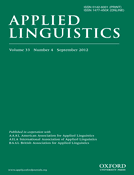
APPLIED LINGUISTICS
Bridging Theory and Practice in Language StudiesApplied Linguistics, published by Oxford University Press, is a premier scholarly journal that has significantly contributed to the fields of linguistics and communication since its inception in 1980. With an impressive impact factor and ranked in the top quartile (Q1) in both Communication and Linguistics and Language categories, Applied Linguistics is recognized for its rigorous peer-reviewed articles that explore the intersections of language, society, and cognition. The journal enjoys a remarkable position in the Scopus rankings, placing it among the top 2% of publications in its discipline. Researchers, professionals, and students benefit from its comprehensive scope, which encompasses innovative research on language acquisition, discourse analysis, and applied linguistics methodologies. Although not an open access journal, its commitment to advancing knowledge and fostering academic discussions makes it an indispensable resource for anyone interested in the critical role of language in various contexts.
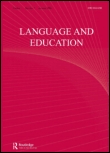
Language and Education
Connecting Language Proficiency with Effective Teaching StrategiesLanguage and Education is a leading academic journal published by Routledge Journals, Taylor & Francis Ltd, specializing in the intersection of language studies and educational practices. With an impressive Q1 ranking in both Education and Linguistics and Language categories for 2023, it stands out as a crucial resource for researchers, educators, and industry professionals. Covering a wide array of topics pertinent to language acquisition, pedagogical methodologies, and culturally responsive education, this journal supports rigorous scholarship in the field. While not currently offering open access options, its contributions are vital for advancing knowledge and fostering innovation across disciplines. The journal's long-term commitment to excellence is evidenced by its high rankings in Scopus, placing it in the 94th percentile in Language and Linguistics and the 80th percentile in Education. Since its inception in 1987, Language and Education has not only tracked the evolving landscape of language education but has also actively shaped it, making it an indispensable tool for anyone invested in educational research and practice.